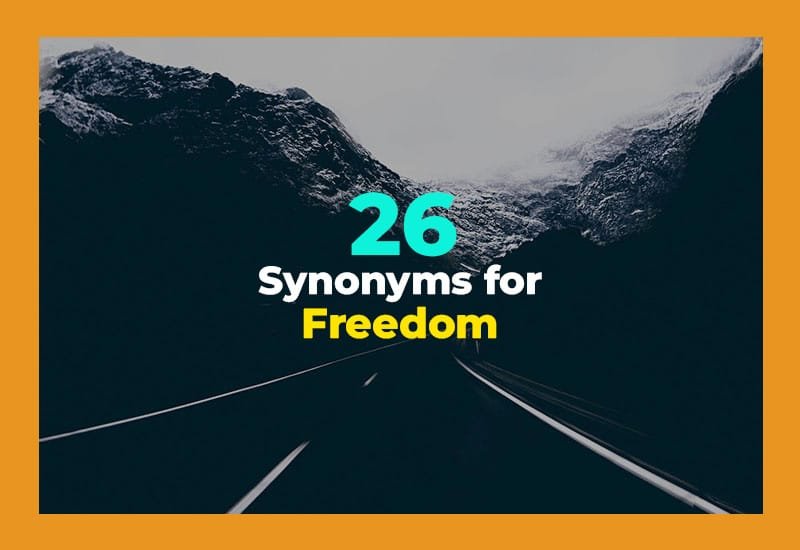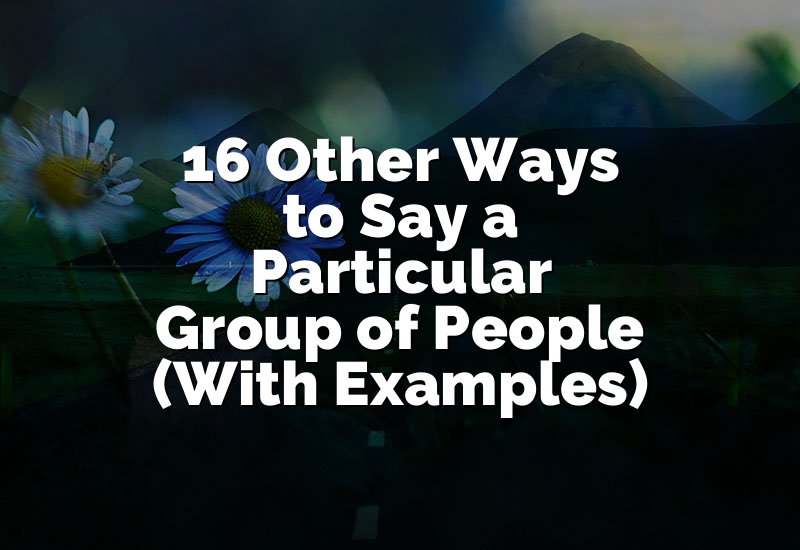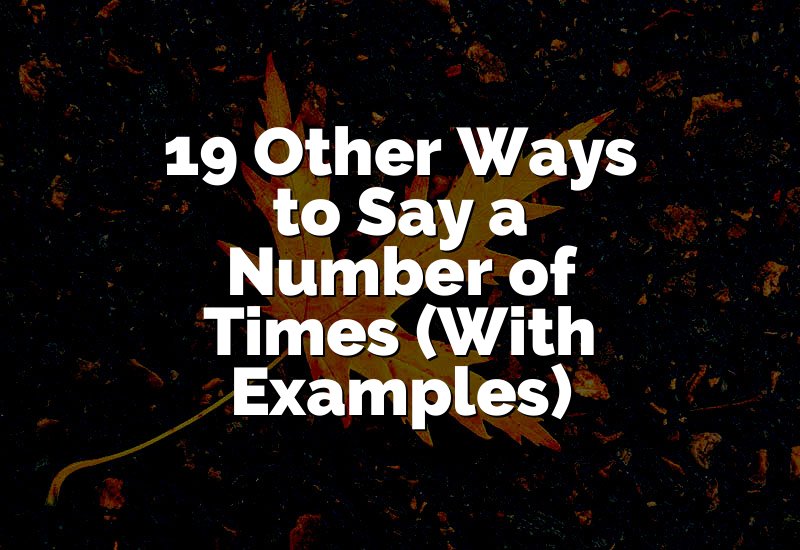Talking about freedom can be exciting because there are so many ways to express it. Whether you want to sound inspiring or just mix up your words, you have options like liberty, independence, or autonomy. In this article, we'll explore 26 different synonyms for freedom and show you how to use them with examples.
| Synonym | Meaning | Example |
|---|---|---|
| Liberty | The state of being free within society | Citizens fought for their liberty during the revolution. |
| Independence | Not being controlled by others | She values her independence and makes all her own decisions. |
| Autonomy | Self-governing or having control over oneself | The region gained political autonomy last year. |
| Emancipation | Being set free from restrictions | The emancipation of slaves changed history forever. |
| Sovereignty | Supreme power or authority | The nation declared its sovereignty in 1776. |
| Self-determination | Freedom to decide one's own path | Young adults often seek self-determination in their careers. |
| Release | Being let go or freed from confinement | After years in prison, he finally experienced release. |
| Privilege | Special rights that allow freedom | Voting is a privilege in democratic countries. |
| Immunity | Protection from restrictions or penalties | Diplomats enjoy immunity from certain laws. |
| Franchise | Right to participate or act freely | Citizens were granted the franchise to vote. |
| Flexibility | Ability to act freely or adapt | Freelancers enjoy flexibility in their schedules. |
| Latitude | Freedom to act as one wishes | The manager gave the team latitude in planning the project. |
| Leeway | Extra freedom to make decisions | Teachers have leeway when grading projects. |
| Release | Letting go of restrictions | The new policy offered release from strict rules. |
| Self-rule | Governing oneself without outside control | The colony achieved self-rule after long negotiations. |
| Liberation | The act of gaining freedom | Liberation from oppressive laws brought hope to the people. |
| Free rein | Total freedom to act | She was given free rein to redesign the office. |
| Unfetteredness | Being unrestricted or unbound | His creativity thrived in unfetteredness. |
| Immunity | Freedom from certain obligations | Judges enjoy immunity in official duties. |
| Noninterference | Freedom from external control | The region operated with noninterference from outsiders. |
| Privateness | Personal freedom or autonomy | He treasured the privateness of his weekend retreat. |
| Independence of mind | Freedom to think and act independently | Independence of mind is crucial for innovation. |
| Choice | The ability to decide freely | He had the choice to accept the job or not. |
| Self-sufficiency | Being able to support oneself | Farmers valued self-sufficiency for survival. |
| Free will | The power to make one's own decisions | Everyone has free will in shaping their life. |
26 Different Ways to Say FREEDOM: Another Word for Freedom
Liberty
Liberty is one of the most classic ways to express freedom. It often relates to legal and political rights, but can also reflect personal freedom. It's a word that brings a sense of dignity and responsibility because it suggests freedom within a system. Liberty works well when talking about society, government, or personal principles. People often choose it to inspire or motivate, as it carries historical weight. When you want to highlight someone's right to act freely, liberty is perfect.
- Citizens fought for their liberty during the revolution.
- Students enjoy liberty in choosing their courses.
- The constitution guarantees liberty for all citizens.
Independence
Independence shows freedom from control or influence. It emphasizes standing on one's own and making decisions without external pressure. Independence can refer to countries, individuals, or even businesses. It's ideal when highlighting self-reliance and personal growth. Using this word signals confidence and responsibility, making it suitable for both formal and informal contexts. Independence is often celebrated as a milestone in life.
- She values her independence and makes all her own decisions.
- The nation celebrated independence day with fireworks.
- Teenagers often seek independence from their parents.
Autonomy
Autonomy highlights self-governance or control over one's life. It's great for talking about personal, organizational, or political freedom. Autonomy suggests a thoughtful kind of freedom, where one is responsible for their choices. It is often used in professional and academic settings to show authority over decisions. People like using autonomy to indicate maturity and the ability to handle responsibilities independently.
- The region gained political autonomy last year.
- Employees appreciate autonomy in managing their tasks.
- Parents encourage autonomy in their children's learning.
Emancipation
Emancipation refers to being freed from restrictions or oppression. It's historically powerful, often associated with civil rights and major social changes. Emancipation implies liberation after struggle, making it meaningful in inspiring contexts. Use it to highlight progress, achievement, or overcoming barriers. The word carries a formal tone but is effective in speeches and essays.
- The emancipation of slaves changed history forever.
- Emancipation allowed workers to form unions.
- Legal reforms led to the emancipation of women in many countries.
Sovereignty
Sovereignty is freedom on a grand scale, often referring to nations or states. It means having supreme authority without outside interference. It's perfect for political discussions or historical contexts. Sovereignty signals control, pride, and self-determination. People often use it when emphasizing independence and power. It's a strong word that carries both respect and responsibility.
- The nation declared its sovereignty in 1776.
- Sovereignty allows a state to make its own laws.
- International agreements respect the sovereignty of nations.
Self-determination
Self-determination highlights the power to choose one's path. It's about deciding without external pressure and taking responsibility for outcomes. This term is motivating and empowering, often used in personal development or political movements. People use it to show autonomy over life choices. It encourages confidence and personal growth, making it highly relatable.
- Young adults often seek self-determination in their careers.
- Communities fight for self-determination to preserve culture.
- Self-determination allows people to shape their futures.
Release
Release means being freed from confinement or restrictions. It can refer to physical, emotional, or legal freedom. The word conveys relief and a fresh start. Release is helpful when discussing outcomes after struggles or changes. It is versatile and can be used in casual or formal situations. People like using release when expressing liberation from limits.
- After years in prison, he finally experienced release.
- Meditation helped her feel emotional release.
- New rules offered release from old restrictions.
Privilege
Privilege suggests freedom that comes with special rights or opportunities. It emphasizes the advantages that allow individuals to act freely. Use it when highlighting societal benefits or personal opportunities. Privilege signals responsibility and awareness of rights. It's ideal when discussing equality, access, or personal freedoms. People often pair it with respect or ethical behavior.
- Voting is a privilege in democratic countries.
- Education is a privilege many children fight for.
- Driving requires recognizing your privilege on the road.
Immunity
Immunity refers to protection from restrictions or consequences. It's often legal or formal, but can also describe exemptions in personal or professional contexts. Immunity emphasizes safety and freedom from interference. People choose this word when discussing legal rights, health, or organizational rules. It shows a level of protection that allows freedom to act.
- Diplomats enjoy immunity from certain laws.
- Immunity from criticism gave him confidence.
- The new policy provided immunity from penalties.
Franchise
Franchise indicates the right to participate or exercise freedom in decisions. Historically, it often relates to voting or civic rights. Franchise conveys empowerment and recognition of individual agency. Use it when highlighting legal rights or personal involvement. It emphasizes the opportunity to act freely in society. People often discuss franchise in political or civic education.
- Citizens were granted the franchise to vote.
- Women fought for franchise in elections.
- The franchise allowed citizens to voice their opinion.
Flexibility
Flexibility shows freedom in adapting or acting without strict limits. It's often personal, professional, or creative freedom. Flexibility signals comfort and versatility in decision-making. People use it when praising adaptive approaches or work-life balance. This synonym is relatable and motivational, emphasizing control over situations.
- Freelancers enjoy flexibility in their schedules.
- Flexibility in planning allows creativity.
- Parents appreciate flexibility in school routines.
Latitude
Latitude emphasizes freedom to act within a defined scope. It's often professional or creative freedom. Latitude encourages responsibility while allowing choices. People use it to describe situations where decision-making power is given. It's ideal for managerial or team contexts. Latitude signals trust and authority.
- The manager gave the team latitude in planning the project.
- Latitude in teaching allows innovative lessons.
- She was given latitude to design her office space.
Leeway
Leeway means extra room to make decisions or act freely. It suggests flexibility and allowance within limits. Leeway is great for personal, work, or legal contexts. People use it to highlight freedom while acknowledging boundaries. It encourages confidence in judgment.
- Teachers have leeway when grading projects.
- The schedule offers leeway for delays.
- Investors had leeway in choosing projects.
Self-rule
Self-rule is governing oneself without external control. It is empowering and emphasizes autonomy. Use it in political or organizational discussions. Self-rule reflects responsibility and decision-making authority. It's ideal when highlighting independence.
- The colony achieved self-rule after long negotiations.
- Self-rule allows students to manage clubs.
- Communities celebrated self-rule with festivals.
Liberation
Liberation means gaining freedom after restriction or oppression. It's emotionally powerful and inspiring. Liberation often follows struggle or advocacy. People use it to celebrate victories and newfound rights. It emphasizes change and empowerment.
- Liberation from oppressive laws brought hope to the people.
- The movement led to cultural liberation.
- Liberation allowed citizens to express themselves freely.
Free rein
Free rein implies total freedom to act without interference. It encourages creativity and responsibility. People use it when granting authority or autonomy. Free rein motivates initiative and trust. It's ideal in professional and creative contexts.
- She was given free rein to redesign the office.
- Writers had free rein to choose their stories.
- Children had free rein in the playground.
Unfetteredness
Unfetteredness is being unbound and unrestricted. It emphasizes complete freedom and openness. People use it to describe creativity, thought, or action without limits. Unfetteredness inspires exploration and confidence. It's a sophisticated way to describe liberty.
- His creativity thrived in unfetteredness.
- The artist worked in unfetteredness.
- Unfetteredness allowed innovation in the company.
Noninterference
Noninterference refers to freedom from outside control. It's often political or organizational. People use it to describe independence and respect for boundaries. Noninterference fosters trust and autonomy. It's ideal for formal contexts.
- The region operated with noninterference from outsiders.
- Noninterference allowed communities to govern themselves.
- The project succeeded due to noninterference policies.
Privateness
Privateness emphasizes personal freedom and autonomy. It refers to space and control over one's life. People use it to highlight boundaries and self-care. Privateness nurtures focus and independence. It works in both casual and professional contexts.
- He treasured the privateness of his weekend retreat.
- Privateness allows for creative thinking.
- The writer valued the privateness of her office.
Independence of mind
Independence of mind is the freedom to think and act independently. It emphasizes judgment and decision-making. People use it in education, work, and personal growth. Independence of mind fosters critical thinking and self-reliance. It's a motivating synonym for freedom.
- Independence of mind is crucial for innovation.
- Leaders value independence of mind in their team.
- Independence of mind encourages original ideas.
Choice
Choice refers to the ability to decide freely. It emphasizes personal power and preference. People use it to highlight options and responsibility. Choice encourages action and independence. It works in motivational and casual contexts.
- He had the choice to accept the job or not.
- Parents encourage choice in hobbies.
- Students enjoy choice in projects.
Self-sufficiency
Self-sufficiency is being able to support oneself. It emphasizes independence and responsibility. People use it for financial, personal, or survival contexts. Self-sufficiency inspires confidence and resilience. It's ideal when talking about personal or community empowerment.
- Farmers valued self-sufficiency for survival.
- Self-sufficiency builds confidence in children.
- Communities strive for self-sufficiency in resources.
Free will
Free will is the power to make one's own decisions. It emphasizes personal responsibility and autonomy. People use it in philosophical, motivational, or casual discussions. Free will inspires action and ethical reflection. It highlights choice and independence.
- Everyone has free will in shaping their life.
- Free will allows individuals to pursue dreams.
- The debate focused on morality and free will.

Final Thoughts
Freedom has many shades, and knowing the right word makes your writing and speech more vibrant. From liberty to free will, each synonym carries unique meaning and context. Choosing the right term can emphasize personal, political, or creative independence, making your expression powerful and inspiring.









